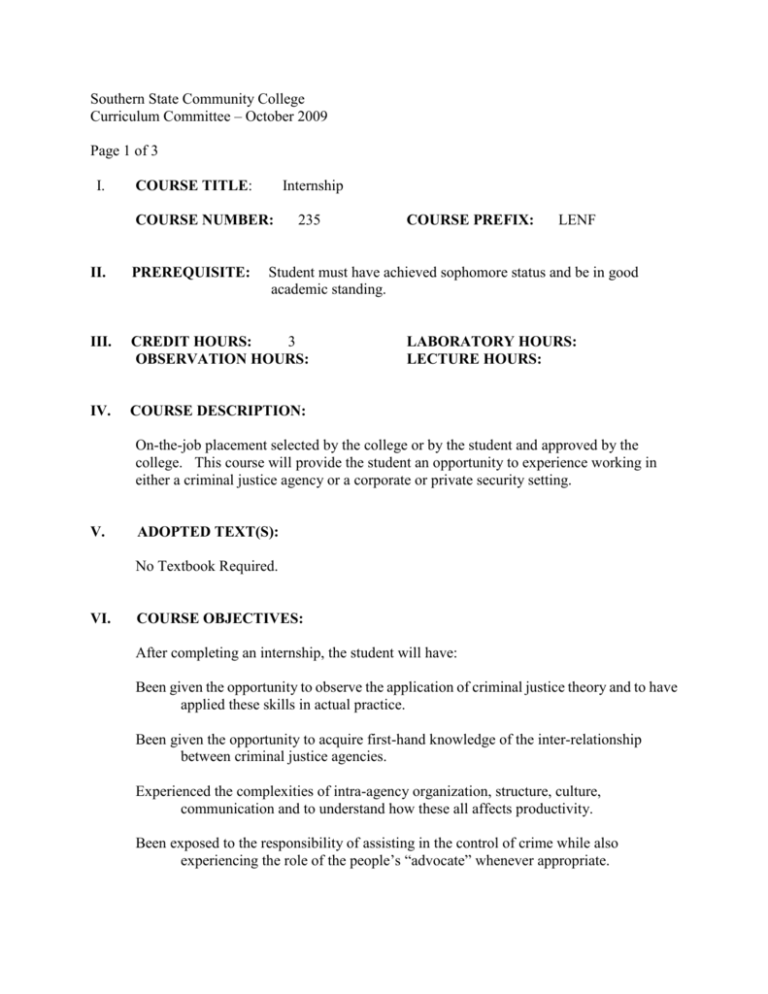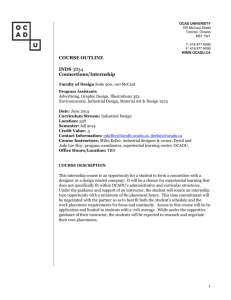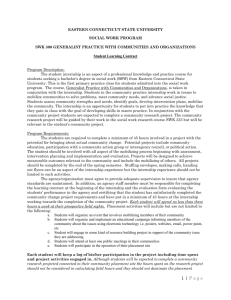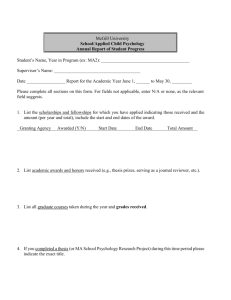LENF 235 - Internship
advertisement

Southern State Community College Curriculum Committee – October 2009 Page 1 of 3 I. COURSE TITLE: Internship COURSE NUMBER: 235 II. PREREQUISITE: III. CREDIT HOURS: 3 OBSERVATION HOURS: IV. COURSE DESCRIPTION: COURSE PREFIX: LENF Student must have achieved sophomore status and be in good academic standing. LABORATORY HOURS: LECTURE HOURS: On-the-job placement selected by the college or by the student and approved by the college. This course will provide the student an opportunity to experience working in either a criminal justice agency or a corporate or private security setting. V. ADOPTED TEXT(S): No Textbook Required. VI. COURSE OBJECTIVES: After completing an internship, the student will have: Been given the opportunity to observe the application of criminal justice theory and to have applied these skills in actual practice. Been given the opportunity to acquire first-hand knowledge of the inter-relationship between criminal justice agencies. Experienced the complexities of intra-agency organization, structure, culture, communication and to understand how these all affects productivity. Been exposed to the responsibility of assisting in the control of crime while also experiencing the role of the people’s “advocate” whenever appropriate. LENF 235 Internship Page 2 of 3 VII. GRADING: The internship will be graded on a pass/fail basis. A final determination of credit will rest upon the satisfactory completion of an internship log, report and performance evaluation submitted by the placement supervisor. VIII. COURSE OUTLINE: * Each placement facilitator/supervisor will provide to the faculty advisor an outline detailing the student’s weekly activities during the internship. IX. OTHER REQUIRED BOOKS AND MATERIALS: None required. X. EVALUATION: ** In order to receive three academic credit hours, students enrolled in an internship must complete sixty (60) clock hours of on-the-job placement. During the internship, the student will maintain a daily log in which all activities will be recorded. This log will be submitted to the faculty advisor along with an 8-10 page paper. The internship report will illustrate the experiences, academic and practical knowledge learned during the course of the placement. The placement supervisor will submit an evaluation summary detailing the student’s performance. The internship log, report and performance evaluation will be reviewed by the faculty advisor and another staff representative from the department. When an internship is judged satisfactory, a grade of “pass” is entered in the student’s record. If there are any differences of opinion as to whether credit is justified, the student may appeal to the Academic Appeals Committee or the Vice President of Academic Affairs. XI. SPECIFIC MANAGEMENT REQUIREMENTS: Student Responsibilities: A student planning an internship must complete an internship application in consultation with a faculty member whose background is appropriate to the type of work involved. The contract will be submitted to the Vice President of Academic Affairs for approval. Following approval, the student must register for academic credit, LENF 235 Internship Page 3 of 3 using the normal registration forms. Once in a placement, the student will conduct him/herself in a professional manner at all times, and completely adhere to agency policies and procedures. The student must maintain a high standard of personal and professional ethics especially regarding the confidentiality of agency records, the identity of clients/offenders, etc. A release form and an “Internship Placement Agreement” between the placement agency and the academic advisor shall be signed by the student before the placement begins. Instructor/Advisor Responsibilities: The Academic Advisor will make every effort to select a placement agency which will provide the student the maximum opportunity to learn and benefit from the internship. The advisor will provide academic supervision to the student while he/she is involved in a placement and communicate as much as is necessary with the agency in order to provide assistance and to maximize benefits to the student and agency. Placement Agency Responsibilities: The criminal justice agency will provide an opportunity for “on-the-job” experience and clearly define the student’s specific role within the agency while in placement. The agency will explain its’ policies, functions and procedures and the expectation of the student’s performance while in placement. The placement supervisor will provide an evaluation of the student’s performance and communicate openly with the college.








